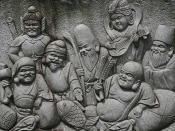The purpose of this paper is to compare the interpretations of Romans 3:21-26 by three scholars, as well as my own interpretation, in light of the American foreign policy known as "The War on Terror" or "The Bush Doctrine". I will begin by summarizing the themes in the book of Romans and my own life context as a starting point for explaining my interpretations of Romans relative to this event. Of the three scholars selected for this exercise, Daniel Patte's argument about racism and its many offshoots, best suits my argument in this paper. I will discuss why Patte's paper suits my interpretation best and I will then discuss the texts of Gaventa, and Johnson as they relate to my own interpretation.
Three main themes command the book of Romans. The first theme is of God's impartiality. This theme is most apparent when Paul describes how God will judge all men equally in Romans 3:23. In short, God shall judge all men, good and evil. Second, Paul says that all have sinned and fall short of the glory of God. This idea of "the universality of human sin" (Gaventa 406) is found in several places but first appears in Romans 1:18-3:20 where Paul argues that sin is found in every human being regardless of their lifestyle. Lastly, the theme of God's righteousness (often found concurrently with the important theme of the universal need for salvation) which is most clearly outlined in the story of Abraham's faith in 4:1-25.
All three of the scholars tend to agree on some level that these three points are the most important. Though the wording and context differs, all of the scholars tend to stress similar ideas about the interpretation of Romans. Therefore, I will not waste time analyzing how the interpretation Gaventa gives...


